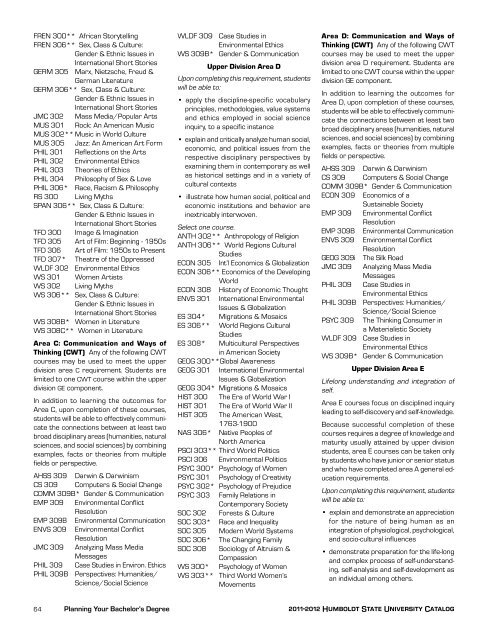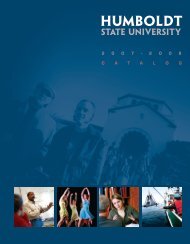2011-12 Academic Year - Bad Request - Humboldt State University
2011-12 Academic Year - Bad Request - Humboldt State University
2011-12 Academic Year - Bad Request - Humboldt State University
You also want an ePaper? Increase the reach of your titles
YUMPU automatically turns print PDFs into web optimized ePapers that Google loves.
FREN 300** African Storytelling<br />
FREN 306** Sex, Class & Culture:<br />
Gender & Ethnic Issues in<br />
Inter national Short Stories<br />
GERM 305 Marx, Nietzsche, Freud &<br />
German Literature<br />
GERM 306** Sex, Class & Culture:<br />
Gender & Ethnic Issues in<br />
Inter national Short Stories<br />
JMC 302 Mass Media/Popular Arts<br />
MUS 301 Rock: An American Music<br />
MUS 302** Music in World Culture<br />
MUS 305 Jazz: An American Art Form<br />
PHIL 301 Reflections on the Arts<br />
PHIL 302 Environ men tal Ethics<br />
PHIL 303 Theories of Ethics<br />
PHIL 304 Philosophy of Sex & Love<br />
PHIL 306* Race, Racism & Philosophy<br />
RS 300 Living Myths<br />
SPAN 306** Sex, Class & Culture:<br />
Gender & Ethnic Issues in<br />
Inter national Short Stories<br />
TFD 300 Image & Imagination<br />
TFD 305 Art of Film: Beginning - 1950s<br />
TFD 306 Art of Film: 1950s to Present<br />
TFD 307* Theatre of the Oppressed<br />
WLDF 302 Environ men tal Ethics<br />
WS 301 Women Artists<br />
WS 302 Living Myths<br />
WS 306** Sex, Class & Culture:<br />
Gender & Ethnic Issues in<br />
Inter national Short Stories<br />
WS 308B* Women in Liter ature<br />
WS 308C** Women in Liter ature<br />
Area C: Communication and Ways of<br />
Thinking (CWT) Any of the following CWT<br />
courses may be used to meet the upper<br />
division area C requirement. Students are<br />
limited to one CWT course within the upper<br />
division GE component.<br />
In addition to learning the outcomes for<br />
Area C, upon completion of these courses,<br />
students will be able to effectively communicate<br />
the connections between at least two<br />
broad disciplinary areas (humanities, natural<br />
sciences, and social sciences) by combining<br />
examples, facts or theories from multiple<br />
fields or perspective.<br />
AHSS 309 Darwin & Darwinism<br />
CS 309 Computers & Social Change<br />
COMM 309B* Gender & Communication<br />
EMP 309 Environmental Conflict<br />
Resolution<br />
EMP 309B Environmental Communication<br />
ENVS 309 Environmental Conflict<br />
Resolution<br />
JMC 309 Analyzing Mass Media<br />
Messages<br />
PHIL 309 Case Studies in Environ. Ethics<br />
PHIL 309B Perspectives: Humanities/<br />
Science/Social Science<br />
WLDF 309 Case Studies in<br />
Environmental Ethics<br />
WS 309B* Gender & Communication<br />
Upper Division Area D<br />
Upon completing this requirement, students<br />
will be able to:<br />
• apply the discipline-specific vocabulary<br />
principles, methodologies, value systems<br />
and ethics employed in social science<br />
inquiry, to a specific instance<br />
• explain and critically analyze human social,<br />
economic, and political issues from the<br />
respective disciplinary perspectives by<br />
examining them in contemporary as well<br />
as historical settings and in a variety of<br />
cultural contexts<br />
• illustrate how human social, political and<br />
economic institutions and behavior are<br />
inextricably interwoven.<br />
Select one course.<br />
ANTH 302** Anthropology of Religion<br />
ANTH 306** World Regions Cultural<br />
Studies<br />
ECON 305 Int’l Economics & Globalization<br />
ECON 306** Economics of the Developing<br />
World<br />
ECON 308 History of Economic Thought<br />
ENVS 301 International Environmental<br />
Issues & Globalization<br />
ES 304* Migrations & Mosaics<br />
ES 306** World Regions Cultural<br />
Studies<br />
ES 308* Multicultural Perspectives<br />
in American Society<br />
GEOG 300**Global Awareness<br />
GEOG 301 International Environmental<br />
Issues & Globalization<br />
GEOG 304* Migrations & Mosaics<br />
HIST 300 The Era of World War I<br />
HIST 301 The Era of World War II<br />
HIST 305 The American West,<br />
1763-1900<br />
NAS 306* Native Peoples of<br />
North America<br />
PSCI 303** Third World Politics<br />
PSCI 306 Environmental Politics<br />
PSYC 300* Psychology of Women<br />
PSYC 301 Psychology of Creativity<br />
PSYC 302* Psychology of Prejudice<br />
PSYC 303 Family Relations in<br />
Contemporary Society<br />
SOC 302 Forests & Culture<br />
SOC 303* Race and Inequality<br />
SOC 305 Modern World Systems<br />
SOC 306* The Changing Family<br />
SOC 308 Sociology of Altruism &<br />
Compassion<br />
WS 300* Psychology of Women<br />
WS 303** Third World Women’s<br />
Movements<br />
Area D: Communication and Ways of<br />
Thinking (CWT) Any of the following CWT<br />
courses may be used to meet the upper<br />
division area D requirement. Students are<br />
limited to one CWT course within the upper<br />
division GE component.<br />
In addition to learning the outcomes for<br />
Area D, upon completion of these courses,<br />
students will be able to effectively communicate<br />
the connections between at least two<br />
broad disciplinary areas (humanities, natural<br />
sciences, and social sciences) by combining<br />
examples, facts or theories from multiple<br />
fields or perspective.<br />
AHSS 309 Darwin & Darwinism<br />
CS 309 Computers & Social Change<br />
COMM 309B* Gender & Communication<br />
ECON 309 Economics of a<br />
Sustainable Society<br />
EMP 309 Environmental Conflict<br />
Resolution<br />
EMP 309B Environmental Communication<br />
ENVS 309 Environmental Conflict<br />
Resolution<br />
GEOG 309i The Silk Road<br />
JMC 309 Analyzing Mass Media<br />
Messages<br />
PHIL 309 Case Studies in<br />
Environmental Ethics<br />
PHIL 309B Perspectives: Humanities/<br />
Science/Social Science<br />
PSYC 309 The Thinking Consumer in<br />
a Materialistic Society<br />
WLDF 309 Case Studies in<br />
Environmental Ethics<br />
WS 309B* Gender & Communication<br />
Upper Division Area E<br />
Lifelong understanding and integration of<br />
self.<br />
Area E courses focus on disciplined inquiry<br />
leading to self-discovery and self-knowledge.<br />
Because successful completion of these<br />
cours es requires a degree of knowledge and<br />
matur ity usually attained by upper division<br />
students, area E courses can be taken only<br />
by students who have junior or senior status<br />
and who have completed area A general education<br />
requirements.<br />
Upon completing this requirement, students<br />
will be able to:<br />
• explain and demonstrate an appreciation<br />
for the nature of being human as an<br />
integration of physiological, psychological,<br />
and socio-cultural influences<br />
• demonstrate preparation for the life-long<br />
and complex process of self-understanding,<br />
self-analysis and self-development as<br />
an individual among others.<br />
64 Planning Your Bachelor’s Degree<br />
<strong>2011</strong>-20<strong>12</strong> <strong>Humboldt</strong> <strong>State</strong> <strong>University</strong> Catalog

















